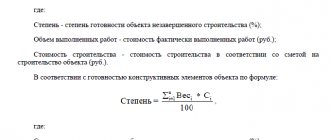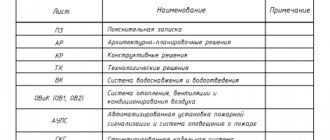What documents are needed to obtain a permit?
To obtain permission to demolish a house, you will need the following documents from the owner:
- passport;
- title documents for the house and land;
- land plan.
If the height of the house is more than 3 floors, then you will also have to prepare design documentation and conduct a state examination.
If the house belongs to several families, you will need a document agreeing on the demolition with the co-owners and their resettlement.
What to do after demolishing a house
After the demolition of the building, you need to invite a cadastral engineer to draw up a house inspection report. Based on this document, a note about the cancellation of the house is made in the technical passport. Next, the owner needs to submit an application to the local branch of the Federal Service for State Registration, Cadastre and Cartography (Gosreestr) to exclude the house from the Unified State Register of Real Estate. The application must be accompanied by a house inspection report, certified by the signature of a cadastral engineer, and a passport of the owner of the building. Now the demolition of the house is legally documented and a new one can be built in its place.
There will be no questions about the new house from the local administration if the old one is demolished correctly
Analytics Publications
The Town Planning Code of the Russian Federation (hereinafter referred to as the RF GRK) was supplemented on August 4, 2018 with a new chapter 6.4 dedicated to the demolition of capital construction projects (hereinafter referred to as the OKS).
In this article, we will analyze the previously existing procedure for regulating the demolition of public buildings and dwell on the newly established demolition rules, including the features of the demolition of unauthorized buildings and objects located in zones with special conditions for the use of territories (hereinafter referred to as ZUIT).
Regulation of the demolition of OKS before the introduction of a new chapter of the Civil Code of the Russian Federation
The legal regulation of the demolition of OKS before the latest changes was of an extremely fragmented nature, which made it possible to talk about the presence of a gap in the law in the area under consideration.
The main issue was the need to obtain permits for demolition.
From the literal interpretation of the provisions of urban planning legislation, it follows that the demolition of buildings and structures is not directly classified as construction or reconstruction work, for the implementation of which, within the meaning of Art. 51 of the Civil Code of the Russian Federation, it is necessary to obtain a construction permit.
A similar position is reflected in judicial practice. For example, the Supreme Court of the Russian Federation refused to bring the organization that demolished the building without a construction permit to administrative liability under Part 1 of Art. 9.5 of the Code of the Russian Federation on Administrative Offenses, which establishes liability for the construction and reconstruction of public housing facilities without this permit.
In its ruling in the case, the Supreme Court of the Russian Federation reflected that the dismantling (demolition) of a non-residential building carried out by the company does not qualify as construction work and, therefore, does not require obtaining a construction permit. At the same time, the supervisory authority that asked to hold the organization accountable did not provide evidence that the dismantling (demolition) of a non-residential building was carried out at the initial stage of construction or as part of the reconstruction work of a capital construction project[1].
Thus, a construction permit for the demolition of public buildings is required only if the demolition of objects is carried out as part of the construction of public buildings, that is, their creation, including on the site of the demolished objects (Clause 13, Article 1 of the Civil Code of the Russian Federation ).
This position seems controversial, since in fact, the demolition (dismantling) of objects can be no less complex and dangerous than the actual construction and reconstruction work.
At the same time, the preparatory work for demolition was reflected in a separate section of the project documentation for construction - the project for organizing work on the demolition of capital construction projects and their parts (from July 1, 2021, taking into account changes in the requirements for the content of project documentation, demolition work is included in a single section "Organization Project construction" (POS)).
At the same time, at the level of regional legislation, a number of acts were in force that established the obligation to obtain certain other permits from state bodies of constituent entities of the Russian Federation or local governments for the demolition of public buildings.
Such rules were established, for example, by the previously in force Decree of the Moscow Government dated December 7, 2004 No. 857-PP “On approval of the Rules for the preparation and execution of earthworks, arrangement and maintenance of construction sites in the city of Moscow.” At the same time, administrative liability is provided for the unauthorized demolition of buildings and structures in Moscow under Part 2 of Art. 8.18 of the Moscow Code of Administrative Offences.
The position on the permissive nature of demolition actions was also reflected in the letter of the Ministry of Economic Development of Russia dated April 16, 2015 No. D23i-1663. As reflected by the Ministry of Economic Development in this letter, the legislation of the constituent entities of the Russian Federation provides that the basis for the demolition of a public housing complex is an order of a local government body, which, among other things, determines the procedure and timing for the demolition of such a facility.
The list of documents required for approval by the local government body of a decision on demolition is determined by the legislation of the constituent entity of the Russian Federation, in particular, such documents include: the owner’s decision on demolition, a project for organizing the work, copies of contract agreements for the implementation of demolition work.
Let us note that regional acts dedicated to the demolition of OKS are sporadic.
Thus, until now, federal legislation has not established rules for the demolition of OKS; regional legislation also does not provide for uniform and detailed regulation.
The existing legal vacuum, however, was filled after the entry into force of Chapter 6.4 of the Civil Code of the Russian Federation.
New rules for the demolition of OKS: general provisions
According to paragraph 1 of Art. 55.30 of the Civil Code of the Russian Federation, the grounds for demolition of an object can be a decision of the owner or, in cases established by law, a decision of a court or local government body.
For the purpose of demolition of the OKS (if the demolition is not carried out for the purpose of constructing a new facility), the developer or technical customer ensures the preparation of a project for organizing demolition work as an independent document based on the results and materials of the site inspection. Work on the preparation of this document must be carried out by a person included in the national register of specialists in the field of architectural and construction design.
Requirements for the work organization project will be established by the Decree of the Government of the Russian Federation. Please note that if demolition is carried out at the expense of budgetary funds, an estimate must also be developed.
Development of a work organization project is not required for the demolition of the following objects: garage; a residential building, a garden house, outbuildings located on a garden plot of land; individual housing construction projects; non-permanent and auxiliary buildings.
The Civil Code of the Russian Federation introduces the concept of a person carrying out the demolition of an object, by analogy with the concept of a person carrying out construction. Such a person may be a developer or an individual entrepreneur, or a legal entity that has entered into a construction contract for demolition.
The person carrying out the demolition ensures compliance with the requirements of the project for organizing work on the demolition of a capital construction project, technical regulations, safety precautions in the process of carrying out work on the demolition of a capital construction project and is responsible for the quality of the work performed.
Thus, urban planning legislation now establishes a specific person who ensures compliance with all mandatory building codes and regulations, and also establishes the possibility of holding him accountable for violating these standards.
Another extremely important innovation aimed at ensuring the safety of demolition work is the requirement that work be performed under contract agreements for demolition only by individual entrepreneurs or legal entities that are members of self-regulatory organizations in the field of construction (with the exception of cases of work performed under contract agreements if the amount of obligations under such an agreement does not exceed one million rubles).
Also, to carry out demolition work, persons exempt from mandatory membership in the SRO may not be members of the SRO when performing engineering surveys, design, construction, in particular: state unitary enterprises, municipal unitary enterprises, state-owned enterprises, commercial organizations with a state share of more than 50% in in the case of concluding contract agreements with public entities and legal entities created by them.
Demolition of the OKS is carried out in accordance with the project for organizing demolition work after disconnecting the facility from the utility networks in accordance with the disconnection conditions issued by the organizations operating the relevant utility networks. Disabling the facility is confirmed by an act signed by the network organization.
To resolve controversial issues of interaction with government bodies during the demolition of a public safety building, the legislation establishes a procedure for notifying the start of work and its completion, as well as providing the authorized body with a project for organizing demolition work.
Thus, for the purpose of demolishing a public housing complex, the developer or technical customer, no later than seven working days before the start of work, sends a notification about the planned demolition of the public housing complex to the local government body of the settlement, city district, municipal district (in relation to inter-settlement territory) at the location of the facility.
The notification of the planned demolition of the facility is accompanied by the results and materials of the OKS survey, as well as a project for organizing the demolition work. In case of failure to provide these documents, the authorized body requests them independently.
The notification and the documents attached to it are subject to placement in the information system for supporting urban planning activities. The local government body also notifies the regional state construction supervision body about the placement of these documents.
After completion of the demolition work, the developer or technical customer sends a notice of completion of the demolition, which is also subject to posting in public sources.
The forms of these notifications must be approved by the Ministry of Construction of Russia. Currently, on the official website for the publication of draft regulatory legal acts, a draft order of the Ministry of Construction of Russia “On approval of forms of notification of the planned demolition of a capital construction project and notification of completion of the demolition of a capital construction project” is posted [2].
We also note the rule established for the transition period: if work on the demolition of the OKS, not related to the construction or reconstruction of the facility, began before August 4, 2021, the development of a project for organizing the demolition work and sending a notice of the start of work on the demolition of the facility is not required .
Features of the demolition of unauthorized buildings and objects within the boundaries of ZOUIT
From August 4, 2021, Article 222 of the Civil Code of the Russian Federation (hereinafter referred to as the Civil Code of the Russian Federation), which defines the signs of unauthorized construction and the consequences of unauthorized construction, has undergone significant revision. The content of these changes, which radically change the legislator’s approach to unauthorized construction and actually introduce the figure of a bona fide developer of unauthorized construction, deserves analysis in a separate article.
In this article we will dwell on the previously not legally established procedural aspects of the demolition of unauthorized buildings, taking into account the latest changes in the Civil Code of the Russian Federation.
Demolition of unauthorized buildings is carried out on the basis of a court decision or, in cases specified in paragraph 4 of Art. 222 of the Civil Code of the Russian Federation, by decision of the local government body (hereinafter also referred to as the compulsory medical insurance).
Article 55.32 of the Civil Code of the Russian Federation establishes the procedure for making a decision on the demolition of an unauthorized building.
Thus, within twenty working days from the date of receipt from supervisory authorities of information about the identification of an unauthorized building, it is obliged to make a decision on the demolition of the unauthorized building or to bring it into compliance with established requirements, in cases where such a right is granted to it by the Civil Code of the Russian Federation, or to go to court with a claim for the demolition of an unauthorized building.
If, based on the results of the analysis of documents received from the supervisory authority, signs of unauthorized construction are not identified, the compulsory medical insurance sends a notification about this to the supervisory authority.
The demolition of an unauthorized structure or its bringing into compliance with established requirements is carried out by the person who created the unauthorized structure, and in the absence of information about such a person - by the legal holder of the land plot on which the unauthorized structure was created, within the period established by the relevant court decision or decision of a local government body.
Please note that unfulfilled responsibilities for the demolition or reconstruction of an unauthorized building are transferred to the new legal holder of the land plot upon transfer of rights to the land plot.
These persons are obliged to carry out the demolition of the building or its reconstruction in accordance with the design documentation approved by the compulsory medical insurance, which provides for bringing the unauthorized building into compliance with the established requirements.
In case of failure to fulfill these obligations within the time limits specified by the decision on demolition, the local self-government body notifies the body exercising the powers of the owner in relation to plots of public property, or files a claim in court for the seizure of a plot of land that is privately owned.
Finally, the Civil Code of the Russian Federation establishes a list of cases when the demolition of a building or its bringing into compliance with established requirements is carried out by the compulsory medical insurance itself at the expense of the budget with reimbursement of expenses from the funds of the rights holders of the building.
The local self-government council carries out the demolition of the building on its own if the copyright holders of the building or land plot have not been identified, or if the copyright holders have not taken action to demolish or reconstruct the building within 6 months from the date of expiration of the established period, and the rights to the land plot have not been transferred to third parties.
In addition, demolition is carried out by compulsory medical insurance if the copyright holders have not demolished or reconstructed an object located on an undivided land plot on which other buildings and structures are also located that are not unauthorized structures.
Changes, no less dramatic than changes in the field of unauthorized construction, from August 4, 2021 affected the legal regulation of zones with special conditions for the use of the territory. Taking into account these changes, the Civil Code of the Russian Federation provides for correlating special rules for the demolition of public buildings located within the boundaries of the ZOOIT.
As a general rule, OKS that fall within the boundaries of the ZOUIT are subject to demolition if the regime of the specified zone does not allow the placement of such objects.
Demolition of the OKS or its bringing into compliance with established requirements is carried out by decision of the owner or on the basis of an agreement on compensation for losses. The specified agreement on compensation for losses is concluded by the owner of the OKS with the copyright holder of the building or structure, in connection with the placement of which a ZOOIT was established.
If an agreement on compensation for damages is not reached, the demolition of the object or its bringing into compliance with established requirements is carried out solely on the basis of a court decision. Moreover, in the event that the establishment of a ZOUIT leads to the impossibility of using the object, the rights holders of the objects in connection with the placement of which the ZOUIT were created, public entities are obliged to purchase such a capital construction object.
To summarize the above, it should be noted that the adopted legislative changes, indeed, fill the previously existing gap in the field of demolition of OKS, establishing both general principles and rules of regulation, as well as special rules regarding the demolition of unauthorized buildings and objects within the boundaries of ZOOIT.
At the same time, it seems that the legislator’s approach to establishing a notification rather than a permitting procedure for the demolition of objects is not entirely clear, given that the special types of responsibility of the person carrying out the demolition for violation of rules and safety requirements have not been defined.
It seems that the introduction of the notification system for the demolition of OKS is associated with a general legislative trend aimed at reducing the number of permitting procedures in construction. At the same time, practice will show whether the new procedures will ensure the safety of the demolition of the OKS.
[1] Resolution of the Supreme Court of the Russian Federation dated October 10, 2016 in case No. A70-13521/2015.
[2] https://regulation.gov.ru/projects#npa=83357










